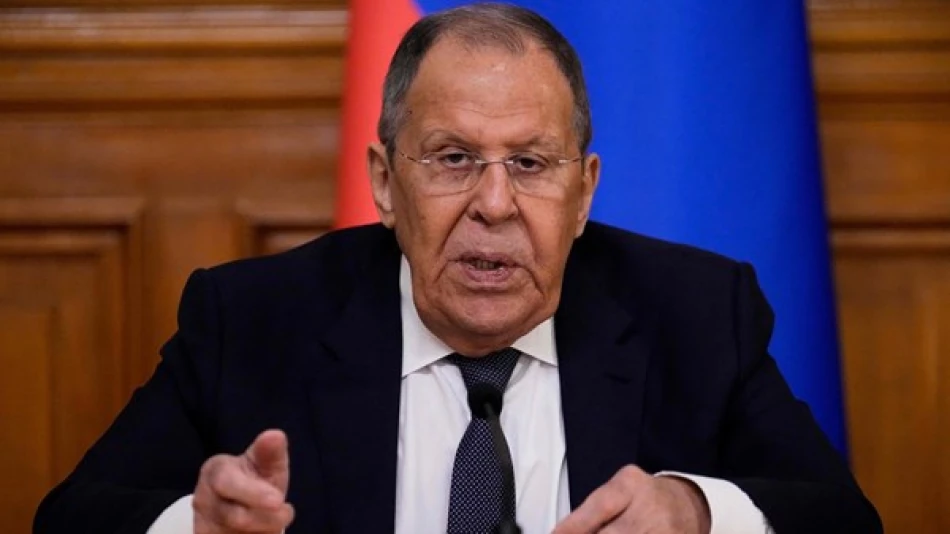
Lavrov Accuses Nations of Undermining Ukraine Peace Efforts
Russia Accuses Ukraine of Sabotaging Trump-Initiated Peace Talks
Russian Foreign Minister Sergey Lavrov has accused Ukraine and unspecified countries of deliberately undermining negotiations to end the Ukraine conflict, despite President Trump's push for direct talks between Presidents Putin and Zelensky. The accusations highlight deepening mistrust that threatens to derail what could be the most significant diplomatic opening since the war began in February 2022.
Lavrov Points Finger at Ukraine for Blocking Progress
In a Sunday interview broadcast on Russian state television via Telegram, Lavrov claimed that Ukrainian authorities are "seeking to disrupt a process established by Presidents Trump and Putin that has yielded very good results." He accused unnamed parties of "looking for pretexts to disrupt negotiations" and expressed hope that "these attempts will be thwarted."
The Russian foreign minister's comments represent a significant escalation in diplomatic rhetoric, particularly given Trump's renewed involvement in Ukraine peace efforts following his return to office. Lavrov's specific mention of Trump suggests Russia views the new U.S. administration as a potential ally in pressuring Ukraine toward concessions.
Zelensky Demands Security Guarantees Before Putin Meeting
Ukrainian President Volodymyr Zelensky has expressed willingness to meet with Putin but insists on securing allied security guarantees first. Earlier this week, Zelensky accused Russia of "seeking to evade holding a meeting," creating a diplomatic standoff where both sides blame the other for blocking progress.
This precondition reflects Ukraine's strategic calculation that any peace deal without robust security architecture would merely provide Russia time to regroup for future aggression. The demand echoes Ukraine's long-standing position that NATO membership or equivalent guarantees are essential for any sustainable settlement.
Security Guarantees Emerge as Key Sticking Point
Russia has firmly rejected any European military presence in Ukraine as part of security arrangements, calling such proposals "completely unacceptable." Moscow insists it must be involved in discussions about any security guarantees for Ukraine, effectively giving Russia veto power over arrangements designed to protect Ukraine from future Russian aggression.
This fundamental disagreement mirrors the security dilemmas that contributed to the war's outbreak. Ukraine seeks guarantees that would deter future Russian attacks, while Russia demands arrangements that preserve its sphere of influence and prevent Western military infrastructure near its borders.
Trump's Diplomatic Gambit Faces Early Test
The current impasse represents an early challenge to Trump's campaign promise to quickly resolve the Ukraine conflict. While Trump's transactional approach and relationship with Putin initially raised hopes for breakthrough negotiations, the entrenched positions of both warring parties suggest any deal will require significant compromises.
The stakes extend beyond Ukraine's borders. Success could establish Trump as a transformative diplomatic figure, while failure might demonstrate the limits of personal diplomacy in resolving complex geopolitical conflicts. European allies are watching closely, concerned that any rushed settlement could compromise long-term regional security.
Historical Precedent Suggests Difficult Path Ahead
Previous attempts at Ukraine-Russia negotiations, including the 2022 Istanbul talks and various ceasefire efforts, have consistently foundered on similar issues of territorial control and security guarantees. The current dynamic, with each side accusing the other of bad faith, follows a familiar pattern that has prevented meaningful progress throughout the conflict.
Unlike earlier diplomatic efforts conducted under wartime pressure, Trump's involvement introduces a new variable that could either break the deadlock or create additional complications if U.S. priorities diverge from European and Ukrainian interests.
Most Viewed News

 Layla Al Mansoori
Layla Al Mansoori






